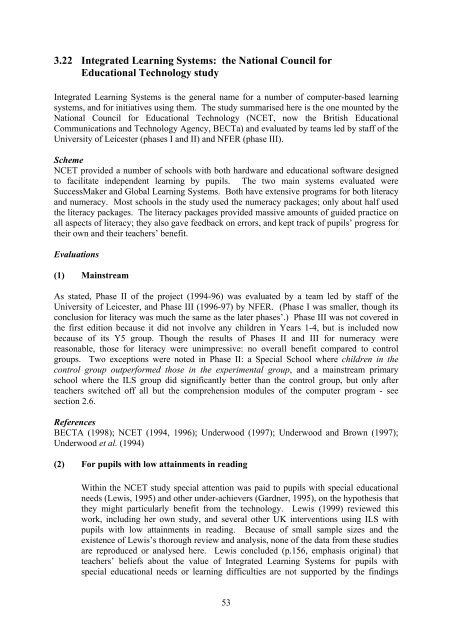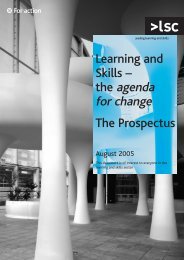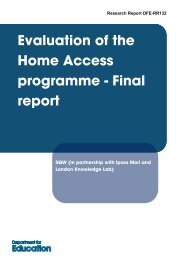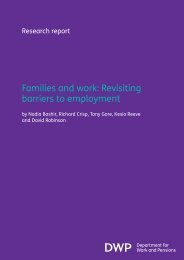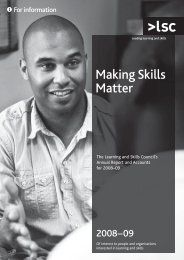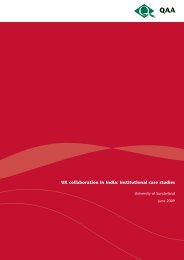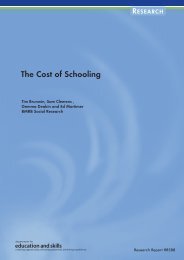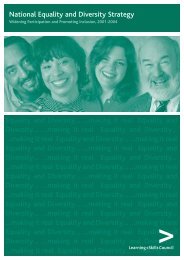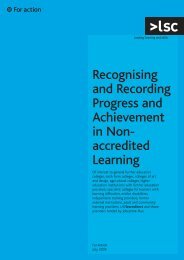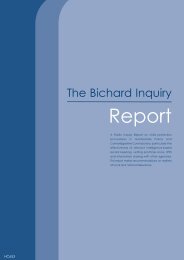What Works for Children with Literacy Difficulties? - Digital ...
What Works for Children with Literacy Difficulties? - Digital ...
What Works for Children with Literacy Difficulties? - Digital ...
Create successful ePaper yourself
Turn your PDF publications into a flip-book with our unique Google optimized e-Paper software.
3.22 Integrated Learning Systems: the National Council <strong>for</strong><br />
Educational Technology study<br />
Integrated Learning Systems is the general name <strong>for</strong> a number of computer-based learning<br />
systems, and <strong>for</strong> initiatives using them. The study summarised here is the one mounted by the<br />
National Council <strong>for</strong> Educational Technology (NCET, now the British Educational<br />
Communications and Technology Agency, BECTa) and evaluated by teams led by staff of the<br />
University of Leicester (phases I and II) and NFER (phase III).<br />
Scheme<br />
NCET provided a number of schools <strong>with</strong> both hardware and educational software designed<br />
to facilitate independent learning by pupils. The two main systems evaluated were<br />
SuccessMaker and Global Learning Systems. Both have extensive programs <strong>for</strong> both literacy<br />
and numeracy. Most schools in the study used the numeracy packages; only about half used<br />
the literacy packages. The literacy packages provided massive amounts of guided practice on<br />
all aspects of literacy; they also gave feedback on errors, and kept track of pupils’ progress <strong>for</strong><br />
their own and their teachers’ benefit.<br />
Evaluations<br />
(1) Mainstream<br />
As stated, Phase II of the project (1994-96) was evaluated by a team led by staff of the<br />
University of Leicester, and Phase III (1996-97) by NFER. (Phase I was smaller, though its<br />
conclusion <strong>for</strong> literacy was much the same as the later phases’.) Phase III was not covered in<br />
the first edition because it did not involve any children in Years 1-4, but is included now<br />
because of its Y5 group. Though the results of Phases II and III <strong>for</strong> numeracy were<br />
reasonable, those <strong>for</strong> literacy were unimpressive: no overall benefit compared to control<br />
groups. Two exceptions were noted in Phase II: a Special School where children in the<br />
control group outper<strong>for</strong>med those in the experimental group, and a mainstream primary<br />
school where the ILS group did significantly better than the control group, but only after<br />
teachers switched off all but the comprehension modules of the computer program - see<br />
section 2.6.<br />
References<br />
BECTA (1998); NCET (1994, 1996); Underwood (1997); Underwood and Brown (1997);<br />
Underwood et al. (1994)<br />
(2) For pupils <strong>with</strong> low attainments in reading<br />
Within the NCET study special attention was paid to pupils <strong>with</strong> special educational<br />
needs (Lewis, 1995) and other under-achievers (Gardner, 1995), on the hypothesis that<br />
they might particularly benefit from the technology. Lewis (1999) reviewed this<br />
work, including her own study, and several other UK interventions using ILS <strong>with</strong><br />
pupils <strong>with</strong> low attainments in reading. Because of small sample sizes and the<br />
existence of Lewis’s thorough review and analysis, none of the data from these studies<br />
are reproduced or analysed here. Lewis concluded (p.156, emphasis original) that<br />
teachers’ beliefs about the value of Integrated Learning Systems <strong>for</strong> pupils <strong>with</strong><br />
special educational needs or learning difficulties are not supported by the findings<br />
53


